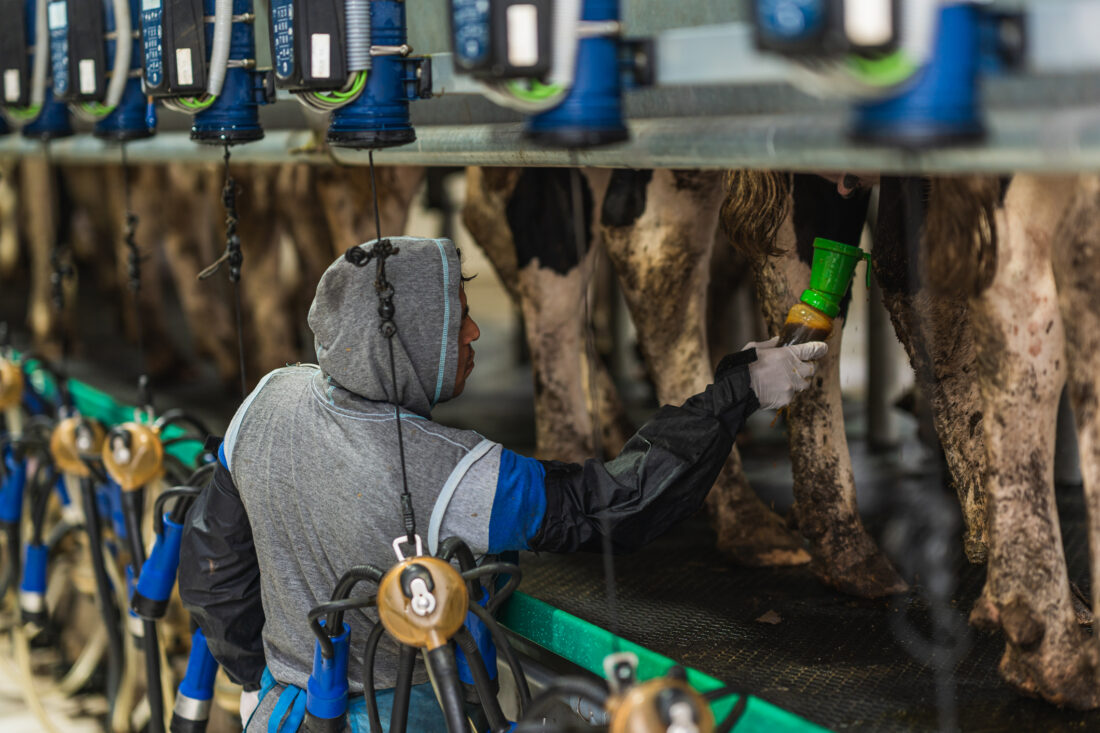
The Racist Roots of Industrial Ag’s Favorite Loopholes
Stopping Agricultural Exceptionalism’s Harm to the Environment and Workers Keeps Getting More Important
By Kelsey Eberly
Senior Staff Attorney
FarmSTAND’s work to bring about a food system that works for everyone depends on a collective fight against “agricultural exceptionalism.” This term means that federal and state governments refuse to apply basic environmental, labor, and animal protections to one industry and one industry alone: agriculture.
This phenomenon is not new, but the rise of factory farming means agricultural exceptionalism is damaging society on a larger scale and in a wider number of ways. Unchecked power and pollution has devastating consequences on workers, rural communities, animals, and our planet.
Less well understood, however, is the racist system that underpins this exceptionalism — and Big Ag’s ongoing effort to protect and preserve it. Nearly a century ago, New Deal legislators made a cynical bargain: They secured the votes necessary to pass the landmark Fair Labor Standards Act and National Labor Relations Act by caving to demands from Southern lawmakers to exempt farm workers and domestic workers from many of the new protections. This ensured that Southern farms could continue exploiting and paying meager wages to the predominantly Black workforce laboring in their fields and homes.
The result? Farm and domestic workers were left ineligible for overtime pay and unprotected from employer interference with efforts to organize to demand better pay or working conditions. Nearly 100 years later, farm workers and domestic workers — overwhelmingly Black, Latino, or from marginalized communities — are still denied these and other basic workplace protections. These include workers’ compensation payments, which we’re fighting for undocumented workers injured on the job to receive.
Shamefully, Big Ag not only continues benefitting from this racist system but fights to keep it year after year.
Indeed, every year since 1946, Congress has included a provision in its annual spending bills to exempt agricultural laborers from collective bargaining protections. And every year since 1976, Congress has restricted the Occupational Safety and Health Administration from enforcing its workplace safety rules on farms with ten or fewer employees. By one estimate, this leaves unprotected workers on 96 percent of the animal agriculture operations that hire workers in the United States.
Big Ag’s proponents even point to the racist exclusions to argue that the federal government cannot require agribusinesses that hire temporary foreign agricultural workers to certify that they won’t retaliate against workers who speak up to protect themselves (we’ve tried to stop these meritless legal challenges). Even minimal protections for the most vulnerable workers seem too much for Big Ag. Little wonder, then, that poverty among farm workers is roughly double that of other wage and salary employees.
Industry has consistently stretched the racist exclusions beyond their bounds: They’ve tried to avoid paying workers overtime or honoring workers’ collective bargaining rights by arguing that industrial and mechanical work performed in connection with livestock and poultry production is exempt “agricultural” labor under the federal statutes.
It’s not. As the Supreme Court found thirty years ago, workers employed by a chicken processor, who travel from farm to farm catching and loading chickens onto trucks for transport to the processor’s factory, are not exempt “agricultural laborers” helping raise the birds. They must be allowed to join the union their processing plant colleagues have formed. Skilled construction workers who lay the concrete and beams of the structures in which agribusinesses will later confine animals cannot fairly be characterized as farmhands performing agricultural labor, another court said. They should be able to pursue claims that their construction company employer violated federal law in failing to pay them overtime wages they’re due.

Sometimes Big Ag’s fantasies win the day, unfortunately. One court recently agreed with an animal waste composting company that its workers hauling and managing hazardous solid waste on a feedlot were exempt from federal overtime protections. The court agreed that, as the company owner testified, “You don’t get more ag than dealing with cattle manure; that’s about as ag as it gets.”
Arguments like this not only enable companies to cheat their workers, they perpetuate industry’s myth that everything toxic and dangerous they do is just a regular small-scale ag practice. They paint the handling and disposing of massive quantities of hazardous waste as managing fertilizer for a farmer. They characterize skilled construction work to build industrial structures as akin to a farmhand helping fix a silo. And they portray workers who labor to catch and transport hundreds of chickens to slaughter and processing plants as similar to wheat threshers helping bring in the harvest. Perpetuating agricultural exceptionalism is at the core every time. And when Big Ag dresses in the garb of small family farms, its economic power grows while small farmers’ wanes.
Thankfully, worker, animal, environmental, and pro-immigrant advocates can speak with a unified voice to dismantle Big Ag’s false autobiography and prevent the tentacles of agricultural exceptionalism from further spreading throughout our laws and society.
Here’s one example: in one of our early landmark cases, advocates successfully argued that animal waste over-applied onto soil and leaking into groundwater was not benign or beneficial fertilizer, but solid and hazardous waste that federal law prohibited industrial dairies from openly dumping. Now, worker advocates are using similar points to argue that workers who manage and process hazardous animal waste—with all the noxious pollutants it contains—must be fairly compensated for that industrial work, rather than as exempt “agricultural” workers.
In other words, worker advocates are combatting Big Ag’s myths—and fighting for justice for their clients—by making some of the very same arguments environmental advocates use to fight the exemption of industrial agriculture pollution from environmental laws.
Congress must end the racist workplace exemptions. It’s a travesty that Big Ag fights to keep them in place—and even fights state laws that change this dismal status quo. Farm workers must be put on level footing with other workers with respect to minimal protections, just as industrial animal facilities must not be treated with kid gloves when they spew noxious air and water pollution or commit animal cruelty. But until we win legal change, advocates must prevent agribusinesses from stretching the exclusions beyond their bounds. They should not be allowed to pretend that the skilled, mechanized labor that workers with independent companies provide to industrial animal operations is “agricultural labor,” and they should not be able to claim that their industrial waste that harms communities is beneficial fertilizer.
At FarmSTAND, we know that countering Big Ag’s lies with a united voice—for workers, for communities, for farmers, for animals—will bring us closer to winning the just and humane food system we all deserve. Together, we can demand basic fairness: that industrial agriculture operations be treated as just that.
